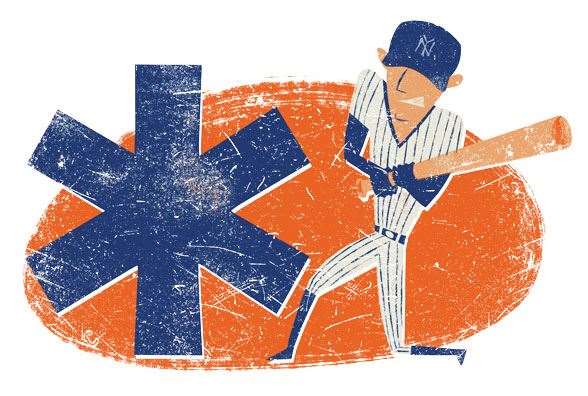Just when you thought a statistic was set in stone ...
In 1961, the New York Yankees’ Roger Maris broke one of baseball’s most celebrated records, swatting 61 home runs to eclipse Babe Ruth’s legendary mark of 60 in 1927. Thing was, Maris set his record in the newly extended 162-game season, from the previous standard of 154. The idea was floated that Maris’ new record should be qualified with an asterisk, which led to the rise of one of baseball’s great urban legends – the Majors didn’t regularly publish an official record book until years later.
However, the larger idea – these days, you’d call it a meme – stuck. For the rest of his life, Maris believed that people viewed his record as tainted. Somewhat fortunately, Maris, who died in 1985 at the age of 51, didn’t live long enough to see his mark broken by steroid freaks. But he’s right. Seek out any book of sports records, and when that six-pointed glyph appears, it stands out like a taunt. And it’s saying: Yeah, but ...
The Asterisk is kindling for the very best sports arguments, or the very worst. They’re the ones in which established facts are held up to the conjectural blowtorch, reducing a champion performance to the what-if of some random butterfly effect. The Asterisk is no longer just in the record books – it’s being applied to our own sports-fan minds.
Recently, I was engaged in an argument after I proffered the opinion to a Scottish colleague that Lleyton Hewitt was an underrated Australian sporting great. He had, after all, been a tennis no.1, a solid enough claim to greatness. The Scotsman guffawed, saying that Hewitt had only reached the top by grace of avoiding the Fed-Rafa-Novak era. His no.1 status was marked. To him, Hewitt’s backward-hand “come on” gesture looked like a misshapen asterisk.
I should have figured out more quickly that he was mounting a pre-emptive case for Andy Murray, but instead was fixated on constructing the “era” defence – roughly, it’s rather unfair to blame an athlete for the time they played in. They should be appreciated for getting to the top of whichever era, a feat in itself.
But just to prove the mendacity that The Asterisk brings out of people, I found myself in a later argument, dangling the menace of The Asterisk. The subject was rugby league’s loss of star power, and I was contending to my league-fiend friend that the absence of Folau, Sonny Bill and now Sam Burgess was perverting the course of rugby league history. Imagine the premierships being won and lost that would have changed hands had those guys been on the field. Asterisks everywhere.
My friend didn’t seem to care. The game’s the game, and whoever’s there plays it. To wind him up further, I pushed the thought experiment out a little: how much of his rugby league fandom was dependent on the idea that when he watched rugby league, these were the finest players of the sport in front of him? If the best leaguies were instead running around earning cheques in the NFL or French union, didn’t this affix a giant historical asterisk to this current era? I took another step down The Asterisk’s wormhole (because once you start, you inevitably have to keep going): what about a future in which tackle football is shown to have brain-deadening properties, and this drove away its athletically gifted cohort to other pursuits, leaving behind a bunch of helots toiling away, a la boxing?
My friend still didn’t care. My annotations were of no concern to him. There are always asterisks, even for Babe Ruth – as impressive as his records were, he set them while never having to play against the most talented black players of his day, barred from playing in the Majors. The elastic nature of sports arguments is probably why they’re so appealing in the first place. That’s the thing about The Asterisk – from another point of view, it can look like a shining star.
Related Articles

We need to formalise the ownership of bragging rights

FIFA earning high praise for its widespread reforms














